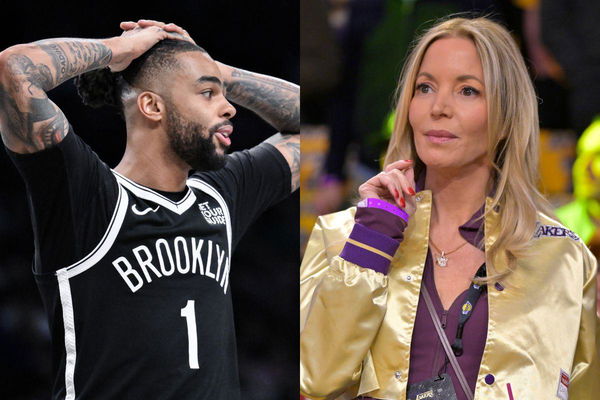
via Imago
Credits: Imagn Images

via Imago
Credits: Imagn Images
Having already played for four teams, D’Angelo Russell has done little to establish his legacy in the NBA. Drafted second overall in 2015, it was the LA Lakers who placed their bet on a young guard to become their next franchise star in a post-Kobe Bryant and pre-LeBron James era. But this gamble did not pay off as the Jeanie Buss ownership had to ship him to Brooklyn after two underwhelming seasons. Yet, as fate would have it, Russell’s story with the Lakers was far from over.
Even after Russell wasted his prime years in Brooklyn and Minnesota, the Purple and Gold, once again, placed their trust in the veteran guard. While many believed his return would reboot his LA career, nothing changed. And when asked about what went wrong, per Russell, the problem was never him but the Lakers’ organization.
“Where I came from, the structure is not the same,” D’Angelo said in a recent interview, contrasting his time in L.A. with his stint in Brooklyn, where he had his breakout season and earned his only All-Star badge. According to the 29-year-old, it was in Brooklyn where he learned to be a professional.
ADVERTISEMENT
Article continues below this ad
“The performance, team, coach — everything about Brooklyn is different than what you would expect. And I’ve been around the league, where I came from the Lakers, where the structure is not the same,” Russell said. “Then I got to Brooklyn, where it’s all structure, and it taught me how to be a professional. I always approached the game to where I was nonchalant, and I felt like I could just wing it… they taught me how to be a professional, how to sleep, how to eat, how to recover.” During his time with the Nets, he averaged 17.9 points, 3.7 rebounds, and 6.2 assists. Growth, thy name is structure.
So what changed? Apparently, everything. From how he recovered from games to how he approached nutrition. The very basic NBA-level stuff that, based on Russell’s account, was severely lacking during his Los Angeles Lakers debut. And this isn’t just an indictment of the training staff or a swipe at a few coaches. It’s a scorched-earth letter to the top. And that brings us back to Jeanie.
Just days before Russell’s truth bomb, Jeanie Buss and her siblings finalized a deal to sell the majority ownership of the Lakers to billionaire sports tycoon Mark Walter, CEO of TWG Global. Valued at an eye-watering $10 billion, the deal instantly became the most expensive transaction in NBA history. Buss still retains a 15% stake and remains the team’s governor, but come on, we all know what it means when someone pays $10 billion for anything. They’re not just here to decorate the owner’s suite.
Jeanie Buss is in the crossfire, yet again
Enter Kendrick Perkins, never one to whisper when he can roar. “You ain’t paying $10 billion without calling shots,” he said. Translation? Jeanie may be in the room, but she might not be the one leading the meeting anymore. And with power shifts come perspective shifts, including how players like Russell feel empowered to, well, tell the truth. Jeanie’s Lakers, at least the version she ran, are being portrayed as a franchise where the vibe was stronger than the vision.
ADVERTISEMENT
Article continues below this ad

USA Today via Reuters
Nov 20, 2016; Los Angeles, CA, USA; Los Angeles Lakers President Jeanie Buss before the game against the Chicago Bulls at Staples Center. Bulls won 118-110. Mandatory Credit: Jayne Kamin-Oncea-USA TODAY Sports
Talent over tactics. Hollywood over health. The fact that D’Angelo Russell‘s comments came unprovoked, years after his initial stint, makes them feel less like a hot take and more like a long-held receipt he’s finally cashing. And guess what? The ripple effects won’t stop with DLo. If Brooklyn is being hailed for professionalism and the Lakers are called out for a lack thereof, how does that impact the next free-agent meeting?
The next rookie camp? The next LeBron decision? Especially when LeBron’s power might be shifting in this new ownership dynamic. As Perkins put it, “There’s a new sheriff in town. Or should I say sheriffs?” And with the Buss era officially “sunsetting,” we’re watching an identity crisis in real time. For players and legends who’ve lived through multiple regimes, this might be a pivot point. For newcomers like Bronny James, it’s about to be a crash course in Corporate Rebrand 101. And for LeBron?
ADVERTISEMENT
Article continues below this ad
This could be one of the most consequential offseasons of his career, with him nearing retirement. He’s no longer just navigating rosters and ring chases. He’s navigating billion-dollar boardrooms and shifting allegiances. Mark Walter didn’t buy the Lakers to blend in. And if Jeanie’s not calling the shots like she used to, then Russell’s candid memories might be the first domino in a much larger culture shift.
Top Stories
Because this story isn’t just about old beef or revisiting bad vibes. It’s about the new DNA of a franchise. Walter, whose sports empire includes the Dodgers and Chelsea FC, thrives on infrastructure and innovation. Two things Russell explicitly said the Lakers lacked during his time there. And maybe that’s the point. The Lakers weren’t broken. They were behind. In an NBA that now values performance metrics, wellness science, and total professionalism, the once-glamorous Lakers might’ve been operating off an outdated script. Now? With Jeanie Buss semi-in, Walter all-in, and Russell unfiltered, the plot just thickened.
ADVERTISEMENT
ADVERTISEMENT
ADVERTISEMENT
ADVERTISEMENT


